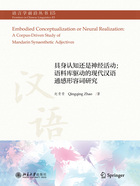
PREFACE
Qualia in psychology and philosophy represents the experiential knowledge of human beings. In linguistics, it is best known in the context of the theory of Generative Lexicon. It goes without saying that experiential knowledge is highly dependent on sensory input. Hence, the study of the sensory lexicon and the linguistic manipulation of sensory words can shed light on how experiential knowledge is conceptualized and lexicalized. Given the above background, it is perhaps not surprising that Dr. Zhao Qingqing built upon her earlier training in Generative Lexicon Theory to focus her PhD study on linguistic synaesthesia, one of the most direct windows to examining how sensory concepts interact, as well as how language may constrain the sensory lexicon.
For those readers who do not yet have a good idea of what synaesthesia means, please go ahead and read this book to learn about this exciting subject. As a reviewer for the Thesis of the Year in Chinese Linguistics notes,“[This]book … is well organized and is written with great clarity and coherence…” For those of you who are working on metaphors and synaesthesia, you will find many new topics and research questions based on a comprehensive set of data and accounts that challenge conventional wisdom. For those who come from the background of neuro-cognitive studies of synaesthesia, you will find exciting links and comparisons to similar findings and contrasting approaches in your field. For those who are interested in language and culture, you will find the culture-and language-dependent mapping directionalities of synaesthesia fascinating.
Dr. Zhao is a dedicated and conscientious scholar who is careful and meticulous with her data, as well as thorough and open-minded in exploring related literature and alternative accounts in different disciplines. She has been a pleasure to collaborate with as a student and as a colleague. Her results presented in this book have shed light on some of the most intricate parts of the mosaic of senses as realized in linguistic synaesthesia. I have no doubt that her own future work and work based on insights from this book will help us to make better sense of the sensory lexicon in the future.
Chu-Ren Huang
Chair Professor
Department of Chinese and Bilingual Studies
The Hong Kong Polytechnic University
Hong Kong
27 June 2019